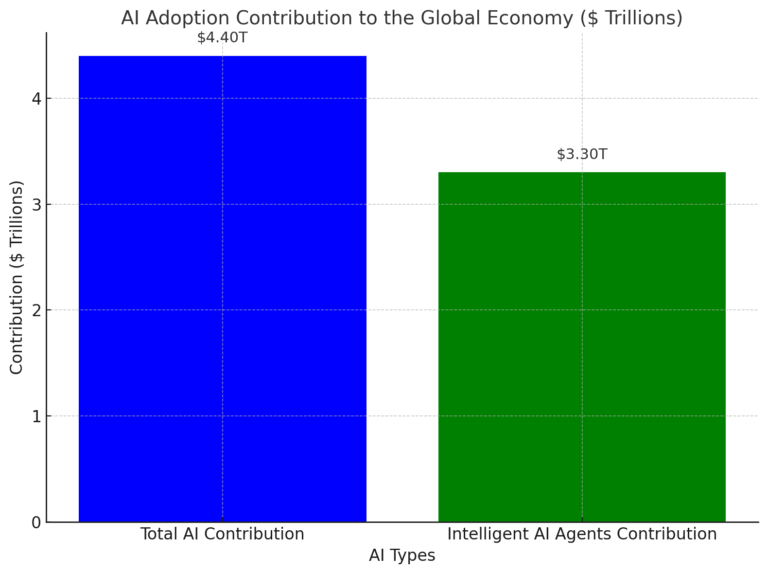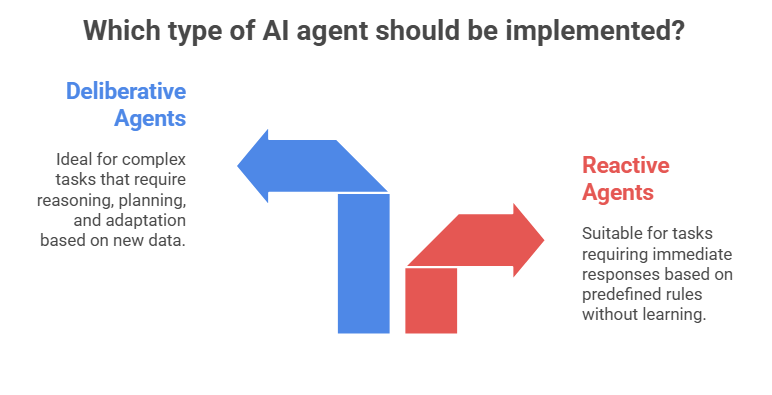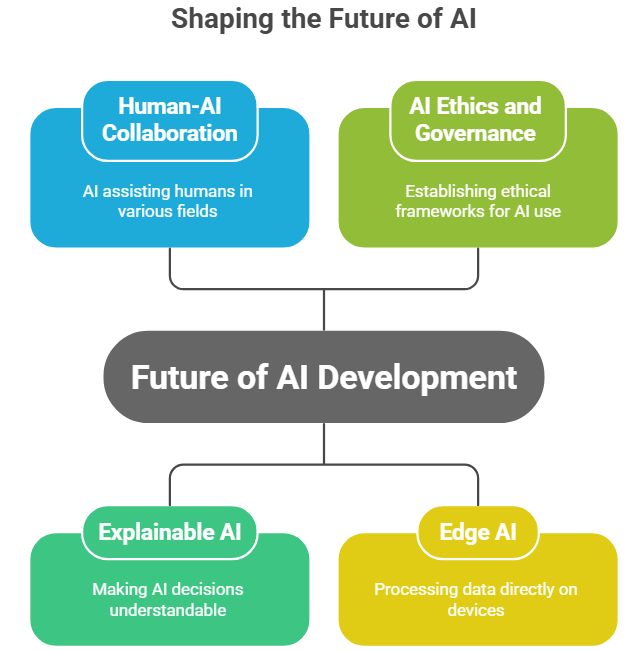How Various AI Agents are Shaping the Future of Technology
A McKinsey report suggests that AI adoption could contribute up to $4.4 trillion annually to the global economy, with a significant share driven by intelligent types of AI agents that automate complex decisions.

Artificial Intelligence (AI) is rapidly transforming industries by enabling machines to make decisions, learn from experience, and adapt to their environment. One of the driving forces behind this AI revolution is AI agents are autonomous systems designed to perform tasks with minimal human intervention.
As businesses look to integrate AI into their operations, AI development company play a crucial role in creating these intelligent systems. From agentic AI development to deploying AI-powered solutions, AI companies are leading the charge toward a more automated future. In this blog, we will explore the different types of AI agents, how they work, and the future trends driving the development of AI.
What is an AI Agent?
AI agents are software systems that autonomously perform tasks based on inputs they receive from their environment. They are designed to mimic human decision-making processes, using techniques such as machine learning, deep learning, and natural language processing (NLP) to analyze data, predict outcomes, and execute actions.
These agents can be categorized into two major types:
- Reactive Agents: These agents react to their environment by following predefined rules and actions. They lack memory and don’t learn from past experiences.
- Deliberative Agents: These agents are capable of reasoning, planning, and learning from previous actions. They adapt their responses based on new data and situations, making them more sophisticated and adaptable.
Both types are being used in applications that range from simple automation tasks to complex problem-solving.

Also Read: Growing Role of AI
Types of AI Agents Revolutionizing Technology
AI agents have become integral to the digital transformation in various industries. Let’s dive deeper into the different types of AI agents that are shaping the future of technology:
1. Conversational AI Agents: Chatbots & Virtual Assistants
One of the most widespread uses of AI agents is in conversational interfaces, including chatbots and virtual assistants. These AI agents interact with users in a natural, human-like manner, enabling businesses to provide 24/7 customer support, enhance user engagement, and automate routine interactions.
- Chatbots: These AI agents can handle everything from answering customer inquiries to guiding users through processes like booking a flight or troubleshooting technical issues. As natural language processing (NLP) technology continues to advance, chatbots are becoming more conversational, responsive, and capable of managing complex queries significantly improving user experience and satisfaction.
- Virtual Assistants: These AI-powered tools help users with everyday tasks such as setting reminders, managing schedules, providing information, or controlling smart devices. As they evolve, virtual assistants are expected to offer more personalized support, understand context more effectively, and even detect emotional tone to respond more naturally.
According to a report by Statista, the global chatbot market is projected to reach $9.4 billion by 2024, highlighting the growing importance of conversational agents in business strategies.
Also Read: Agentic Systems Beyond Chatbots
2. Autonomous AI Agents: Self-driving Vehicles & Drones
AI agents are also playing a pivotal role in the development of autonomous systems, including self-driving cars and drones. These AI-powered machines are transforming industries such as transportation, logistics, and surveillance.
- Self-driving cars: Autonomous vehicles use a combination of sensors, machine learning, and AI to navigate roads, recognize obstacles, and make real-time decisions.
- Drones: AI agents are increasingly being used in autonomous drones for tasks such as surveying land, delivering packages, and inspecting infrastructure. These drones can navigate autonomously, analyze real-time data, and even perform emergency rescues in areas inaccessible by humans.
Also Read: Growing Role of AI
3. AI-powered Recommendation Systems
AI-powered recommendation systems are integral to sectors such as e-commerce, entertainment, and social media. These AI agents analyze user behavior, preferences, and patterns to deliver personalized recommendations.
- E-commerce: AI agents suggest products based on a user’s browsing behavior, purchase history, and personal preferences. These recommendation systems help improve the shopping experience, increase conversion rates, and drive customer engagement by delivering highly relevant product suggestions.
- Streaming Services: AI-powered recommendation systems analyze viewing or listening habits to suggest content that aligns with user interests. By tailoring recommendations to individual preferences, these agents help platforms keep users engaged for longer periods and enhance overall satisfaction.
A McKinsey report reveals that companies that implement AI-powered personalization see an increase in customer engagement of 20% to 30%, underscoring the importance of recommendation agents in business strategy.
4. Robotic Process Automation (RPA) Agents
Robotic Process Automation (RPA) agents are AI systems used to automate repetitive, time-consuming tasks, enabling businesses to streamline operations and reduce costs. These agents can perform a variety of administrative tasks, from data entry to invoice processing, with a high degree of accuracy and efficiency.
- Application in Businesses: AI-powered RPA systems help organizations in sectors like finance, healthcare, and retail by automating back-office operations. This allows employees to focus on higher-value tasks, improving productivity and reducing human error.
According to Gartner, the global RPA market is expected to grow from $1.89 billion in 2021 to $11.8 billion by 2027, demonstrating the increasing reliance on AI agents to automate processes and drive efficiencies.
Also Read: Implement RPA to Get It Done Right Away
5. Decision-Making AI Agents: Analytical & Predictive Models
AI agents are revolutionizing business intelligence and decision-making processes by analyzing large datasets and making predictions based on trends and patterns.
- Predictive Analytics: AI agents analyze historical data to forecast future outcomes, enabling businesses to make more informed decisions. For instance, AI agents in the finance industry predict stock market movements, while in healthcare, they help in predicting patient outcomes.
- Automated Decision-making: In industries like insurance, banking, and retail, AI agents assist in processing claims, evaluating loan risks, and recommending products by automating decision-making processes. This not only improves efficiency but also ensures more consistent and unbiased decisions.
The Future of AI Development: What It Will Look Like

The future of AI is poised for even more significant transformation, with AI agents continuing to evolve and become more integrated into daily life. Here are a few key trends shaping the future of AI development:
- Human-AI Collaboration: Rather than replacing human workers, AI agents will increasingly augment human capabilities. In healthcare, for instance, AI agents will assist doctors in diagnosis and treatment, while in education, they will provide personalized learning experiences.
- Explainable AI (XAI): As AI systems become more complex, there is a growing need for transparency in decision-making. Explainable AI aims to make AI decisions understandable to humans, especially in critical fields like healthcare and finance.
- AI Ethics and Governance: With AI playing an increasingly prominent role in decision-making, ethical considerations regarding data privacy, bias, and accountability are becoming crucial. AI developers and businesses will need to establish frameworks for responsible AI use.
- Edge AI: As AI systems become more powerful, there is a trend toward edge AI, where data processing happens directly on devices, reducing the need for cloud computing. This shift is expected to improve real-time decision-making.
The Upsides and Downsides of AI Agents
As we explore different AI agent types, it is essential to understand not just their amazing benefits but also the challenges that come with implementation. Businesses and researchers must balance efficiency and innovation with responsibility and reliability.
Benefits of AI Agents
AI agents are transforming how any system learns, collaborates, and adapts. There are tons of advantages that extend across industries, from driving performance gains to delivering more personalized experiences.
- Efficiency & Productivity Boost – By combining Agentic AI with autonomous decision making, AI agents streamline workflows and cut down repetitive tasks, adding faster and more accurate outcomes.
- Scalability – AI agents handle increasing workloads effortlessly, allowing businesses to scale operations with proportional increases in human effort.
- Learning & Personalization – With continuous learning, agents adapt to users’ preferences and behavior, giving them tailored solutions and improving over time.
- Collaborative Potential – AI agents can easily integrate with all systems and human teams, providing collaboration that enhances efficiency and innovation.
Challenges of AI Agents
Despite their strong potential, AI agents still face hurdles that can limit their adoption. Addressing these issues is important for sustainable and ethical growth.
- Computational Cost – Running advanced AI models demands a lot of processing power, raising concerns over infrastructure costs.
- Reliability & Hallucination – AI agents may give incorrect or fabricated responses, undermining trust in critical applications.
- Integration Complexity – Adding AI agents into an existing system mostly needs significant technical effort and restructuring.
- Ethical & Business Uncertainty – Questions around data privacy, accountability, and impact on jobs give risks that organizations must navigate carefully.
Wrapping Up
AI agents are rapidly transforming how businesses operate from automating routine tasks and improving customer interactions to delivering powerful insights through data. These technologies aren’t just trends; they’re becoming essential tools for staying competitive in a fast-evolving digital world.
As an experienced AI development company, App Maisters helps organizations turn AI potential into real-world results. Through tailored, agentic AI solutions, we focus on building systems that not only enhance efficiency but also drive innovation and long-term growth.
FAQs
What is an AI agent and how does it work?
An AI agent is a software system designed to autonomously perform tasks by interacting with its environment using data inputs. It uses machine learning, natural language processing, and decision-making algorithms to analyze information and take actions. At App Maisters, we develop AI agents that range from reactive systems to advanced deliberative agents capable of learning and adapting in real time.
What are the different types of AI agents used in business?
Common AI agent types include conversational AI agents like chatbots and virtual assistants, autonomous agents used in self-driving vehicles and drones, recommendation systems in e-commerce, robotic process automation (RPA) agents for workflow automation, and decision-making agents for predictive analytics. App Maisters specializes in creating customized AI agents tailored to various industries to maximize efficiency and innovation.
How can AI agents improve customer service?
AI agents such as chatbots and virtual assistants provide 24/7 support, handle multiple queries simultaneously, and personalize customer interactions using natural language understanding. This reduces wait times and enhances user experience. App Maisters builds conversational AI solutions that improve engagement and streamline customer service operations.
What are the challenges businesses face when implementing AI agents?
Key challenges include high computational costs, integration complexity with existing systems, potential AI errors or hallucinations, and ethical concerns around data privacy and bias. App Maisters offers expert guidance to overcome these hurdles by ensuring responsible AI development, seamless integration, and ongoing system optimization.
How is AI development evolving with trends like Explainable AI and Edge AI?
The AI industry is moving towards Explainable AI (XAI) to increase transparency in AI decision-making and Edge AI to enable real-time data processing on local devices, reducing latency. App Maisters stays at the forefront of these trends by developing explainable, efficient AI solutions that empower businesses to trust and scale their AI applications.
Why should businesses partner with an AI development company like App Maisters?
Partnering with App Maisters ensures access to cutting-edge AI expertise, from agentic AI development to deployment of scalable AI-powered solutions. Their tailored approach helps organizations harness AI’s full potential to automate processes, improve decision-making, and drive sustainable growth.




















